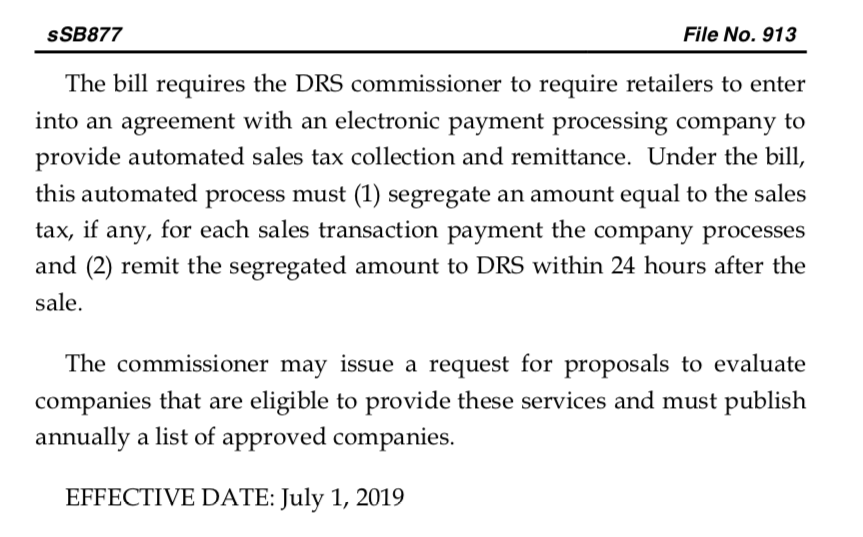Buried in the budget proposal from the Finance, Revenue and Bonding Committee is a controversial change to the way Connecticut collects sales tax – one that has failed in several other states and one that the former Commission of the Department of Revenue Services said would be a costly “scheme.”
According to the bill, businesses which provide credit card services will have to enter into an agreement in which the company processing the electronic payment pays the sales tax to the state immediately – known as “real time sales tax collection.”

The move would essentially give Connecticut a one-time, one-month boost in sales tax revenue, helping to mask the current year’s budgetary shortfall.
There’s just one problem: credit card companies say there is no viable method for doing this because the technology does not currently exist.
The Card Coalition – a financial services trade association – says that, if passed, Connecticut would be the only state in the country to have real-time sales tax collection — and for good reason.
Massachusetts considered a similar policy in 2017 but discarded the idea after a study by the Council on State Taxation (COST) determined the change would result in “up-front costs of $1.22 billion and annual recurring expenses of $28 million.”
Similar efforts have been rejected in Arizona and Missouri.
Patrick J. Reynolds, Senior Tax Counsel at COST wrote to the Connecticut General Assembly that the bill provision would “require Connecticut businesses to invest staggering sums of money to implement new sales tax remittance systems that would provide very little benefit to the State.”
Reynolds went on to note that despite the cost to both Massachusetts and businesses, the state would have only seen a one-time sales tax shift of $125 million.
Section 19 would require Connecticut businesses to invest staggering sums of money to implement new sales tax remittance systems that would provide very little benefit to the State. Any of the purported benefits can be achieved without mandating huge investments by simply requiring retailers to make estimated prepayments of sales tax.
Patrick J. Reynolds, Senior Tax Counsel, Council on State Taxation
The Office of Fiscal Analysis estimated the automation of sales tax would result in a $20 million gain for both fiscal years 2020 and 2021.
The immense costs of implementing real-time sales tax collection is primarily because it would require new software to remit instant sales tax revenue to the state – software that does not currently exist, according to the Card Coalition and other organizations.
“Some vendors claim to offer software systems that have been specifically created to allow payment processors to remit sales taxes,” the Card Coalition wrote. “But we have seen no documentation that suggests that software products in the marketplace today have resolved outstanding concerns about how they would function in the marketplace.”
The Washington D.C.-based Americans for Tax Reform labeled the accounting shift a “fantasy.”
“The capability and technology to separate sales tax and remit it directly to the government does not currently exist,” ATR wrote. “Payment processors only get the most basic information needed to approve a sale.”
Similarly, the National Coalition of State Legislators created a task force in 2013 to study the issue and concluded they could not recommend such a change, calling it “complicated, really complicated.”
In 2013, Connecticut’s Department of Revenue Services tried something similar with a pilot program designed to get delinquent sales taxpayers to remit payment to the state within two days.
Former DRS Commissioner Kevin Sullivan labeled real time sales tax collection a “scheme” and said it was a “solution in search of a problem or at least it’s the wrong solution.”
“Unfortunately, what this proposal will do is add significant costs to credit care processors, retailers, and ultimately consumers,” Sullivan told Finance, Revenue and Bonding Committee in 2016. “It will also add significant costs to DRS. Those who will overwhelmingly bear the cost and added fees and expenses are retailer who are already meeting their state tax obligations in full and on time.”
The attempt to move toward real-time sales tax collection has not received much attention but marks the second attempt to change the way Connecticut levies taxes in an effort to boost revenue without actually raising taxes.
Late in the legislative session, reports indicated the governor may be considering replacing the income tax with a payroll tax that would reportedly raise tax revenues while saving businesses money.
However, according to the governor, that proposal proved too complicated to take on during the session.
While the shift from an income tax to a payroll tax would require a lot of changes to Connecticut’s tax collection, the automated sales tax remittance would require credit card companies to implement something with no way of knowing how they could do it and implied they may not be able to offer services in the state.
“Connecticut would be the only state to impose such a system,” the Card Coalition wrote. “If payment processors and payment networks cannot readily reconfigure their systems with additional platforms and bandwidth while remaining interoperable, Connecticut residents could be at a distinct disadvantage if they are not able to have the convenience of engaging in electronic payments – a burden on consumers and retailers alike.”


Ron page
May 29, 2019 @ 8:00 am
Another proposal that burdens taxpayers, crushes businesses, and limits options.
Of course the governor and democrat legislators will pursue this plan. All for a one-shot 30-day reduction in collection time.